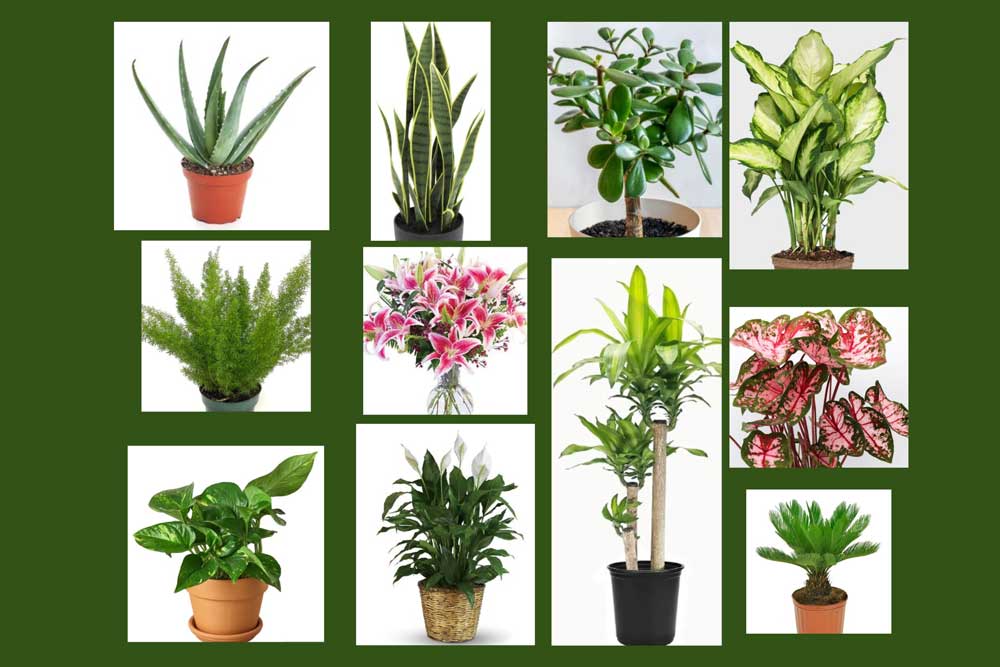We all love having plants in our home. They add a natural beauty to our home’s décor and create a calming atmosphere. Many house plants are known for their air-purifying qualities, which can help reduce toxins in the air.
However, we must be careful with the plants we choose as many can be poisonous to pets if ingested, and it’s important to be aware of which plants can be harmful to your furry friends. Some of these plants may also be used for outdoor landscaping. If your pet has access to these plants in your yard be sure to keep an eye on your pets and do not let them lick or eat any of these toxic plants.
Here’s a list of the most common houseplants:
- Corn Plant (Dracaena frangrans)
This plant is toxic to pets if ingested. It contains saponins, which can cause vomiting, drooling, and loss of appetite in pets. In severe cases, ingestion of this plant can lead to diarrhea, lethargy, and even kidney failure.
- Snake Plant (Sansevieria)
Snake plants are poisonous to pets if ingested. Snake plants contain saponins, which can cause gastrointestinal upset, vomiting, and diarrhea in pets. Ingestion of snake plants can also lead to drooling, nausea, and difficulty swallowing.
While snake plants are generally considered to be a low-toxicity plant, it’s still important to keep them out of reach of pets or avoid them altogether if you have pets in your home.
- Aloe Plant (Aloe vera)
Aloe plants can be toxic to pets if ingested in large quantities. The plant contains saponins, which can cause vomiting, diarrhea, loss of appetite, depression, and tremors in pets.
While the toxicity of Aloe is generally considered mild, it’s always best to keep the plant out of your pet’s reach, especially if your pet tends to chew on plants. If you suspect that your pet has ingested Aloe, monitor them closely and contact your veterinarian if you notice any signs of illness.
It’s worth noting that Aloe vera is also commonly used in pet care products such as shampoos, and in small amounts, it is generally considered safe for pets. However, if you’re unsure about the safety of any product containing Aloe, it’s always best to check with your veterinarian before using it on your pet.
- Jade Plant (Crassula argentea)
The Jade Plant can be toxic to pets if ingested in large quantities. The plant contains a toxin called bufadienolides, which can cause vomiting, depression, loss of coordination, and, in severe cases, a slowed heart rate or even death.
While the toxicity of Jade Plant is generally considered mild, it’s always best to keep the plant out of your pet’s reach, especially if your pet tends to chew on plants. If you suspect that your pet has ingested Jade Plant, monitor them closely and contact your veterinarian if you notice any signs of illness.
It’s also important to note that, like Aloe vera, Jade Plant is a common ingredient in some pet care products, including shampoos and topical treatments. In small amounts, it is generally considered safe for pets, but if you’re unsure about the safety of any product containing Jade Plant, it’s always best to check with your veterinarian before using it on your pet.
- Lilies (Many varieties)
Lilies are highly toxic to cats, and even small amounts of ingestion can cause severe kidney damage or even death. It’s important to note that all parts of the lily plant are toxic, including the leaves, flowers, and even the water in the vase.
Dogs are also sensitive to lilies but are less likely to be affected than cats.
Some of the symptoms of lily toxicity in cats include vomiting, diarrhea, loss of appetite, lethargy, and dehydration. If left untreated, it can lead to kidney failure, which can be fatal.
If you suspect that your cat has ingested any part of a lily plant, seek veterinary care immediately. Your vet may need to induce vomiting, provide supportive care, and monitor kidney function closely.
If you have cats, it’s best to avoid having lilies in your home or garden. If you receive a bouquet containing lilies, remove them from your home immediately, or keep them in a place where your cats cannot access them.
- Caladium or “Elephant Ear”
Caladiums are poisonous to pets if ingested. Caladiums contain calcium oxalate crystals, which can cause oral irritation, intense burning and swelling of the mouth, tongue, and lips, drooling, vomiting, and difficulty swallowing if ingested by pets. In severe cases, ingestion of caladiums can also lead to respiratory distress and potential choking hazards.
It’s important to keep caladiums and other toxic plants out of reach of your pets or avoid them altogether if you have pets in your home. If you suspect that your pet has ingested any part of a caladium or any other toxic plant, you should contact your veterinarian or a pet poison control hotline immediately. Early intervention can help minimize potential harm to your pet.
- Dieffenbachia or “Dumb Cane”
Dieffenbachia, also known as Dumb Cane, is toxic to pets if ingested. The plant contains needle-like crystals of calcium oxalate, which can cause severe irritation and swelling of the mouth, tongue, and throat.
Symptoms of Dieffenbachia toxicity in pets may include drooling, difficulty swallowing, vomiting, and decreased appetite. In severe cases, it can cause respiratory distress and even death.
- Asparagus Fern
The Asparagus Fern (Asparagus densiflorus) can be toxic to pets if ingested in large quantities. The plant contains sapogenins, which can cause vomiting, diarrhea, abdominal pain, and skin irritation in pets.
While the toxicity of Asparagus Fern is generally considered mild, it’s always best to keep the plant out of your pet’s reach, especially if your pet tends to chew on plants.
It’s also important to note that Asparagus Fern is sometimes confused with the edible asparagus plant, which is safe for pets to eat. Make sure you can correctly identify the plant in question before allowing your pet to consume any part of it.
- Pothos or “Devil’s Ivy” (Epipremnun aureum)
Pothos, also known as Devil’s Ivy, is toxic to pets if ingested. The plant contains insoluble calcium oxalate crystals, which can cause irritation and swelling of the mouth, tongue, and throat.
Symptoms of Pothos toxicity in pets may include drooling, difficulty swallowing, vomiting, and decreased appetite. In severe cases, it can cause respiratory distress and even death.
- Sago Palm (Cycas revoluta)
These plants are found indoors and out. The Sago Palm is highly toxic to dogs and cats, as well as horses and birds if ingested. All parts of the plant, including the seeds, leaves, and roots, contain cycasin, a toxin that can cause severe liver damage, vomiting, diarrhea, abdominal pain, and even death in pets.
Even a small amount of the Sago Palm can be deadly to these animals, so it’s essential to keep this plant out of their reach.
If you suspect that your pet has ingested any part of one of these toxic plants, it’s important to contact your veterinarian or a pet poison control hotline immediately. The sooner the poisoning is addressed, the easier and less expensive it is to treat. They may recommend inducing vomiting or other treatments to prevent further absorption of the toxins.
Here are two numbers you can call:
- ASPCA Animal Poison Control Center at (888) 426-4435 (may be a fee).
- Pet Poison Helpline (855) 764-7661 ($85 fee).
To prevent your pets from ingesting any of these plants, it’s best to keep them out of their reach or consider choosing a pet-safe alternative.




